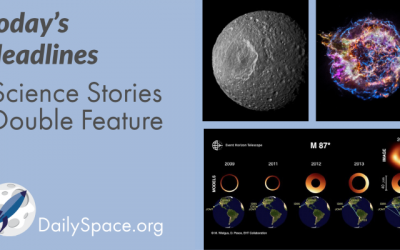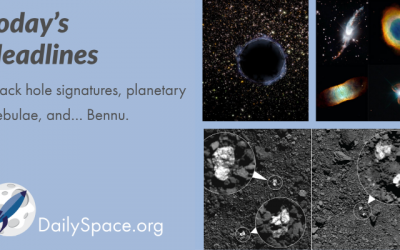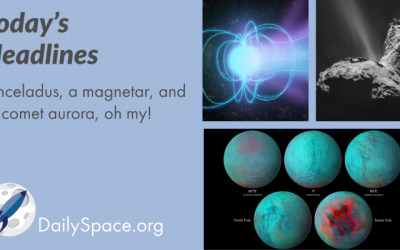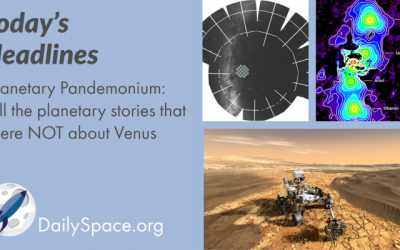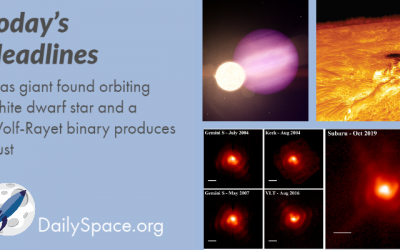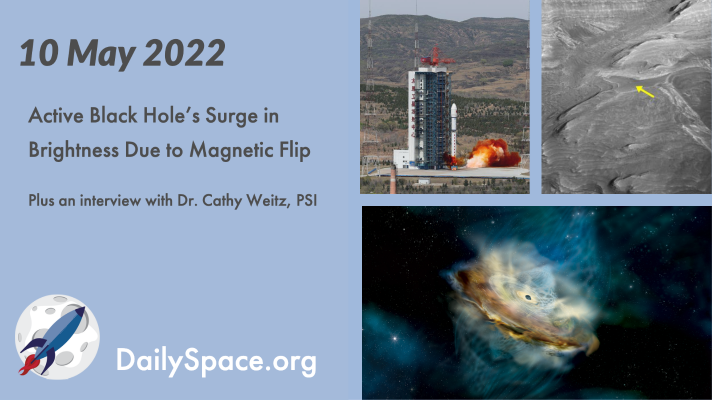
Active Black Hole’s Surge in Brightness Due to Magnetic Flip
A luminous black hole already classified as an active galactic nucleus brightened suddenly in recent ground and space observations, and the cause may be due to a sudden flip in the magnetic poles. Plus, community science, rockets, Ingenuity, and an interview with Dr. Cathy Weitz from Planetary Science Institute.
Catch us on NowMedia TV
Saturday 11pm Central / midnight Eastern
Sunday 10pm Central / 11pm Eastern
Watch live on these stations: Houston 21.10, Atlanta 22.10
or tune-in on Apple TV, Roku, YouTube Live, or Amazon Prime
Science Story Double Feature
Join us today for a first-ever double feature episode. Dr. Pamela and Beth will cover the latest in astronomy and planetary science.
Rocket Roundup for September 23, 2020
Join us for this week’s Rocket Roundup with host Annie Wilson as we look back at the launches that happened from the past week, including one from China and a bonus, first-of-its-kind, sub-orbital launch from Australia.
Black hole signatures, planetary nebulae, and… Bennu
Astrophysicists have finally figured out how to tell neutron stars apart from black holes by finding the signature of the event horizon. Another team discovered that planetary nebulae likely get their unique shapes due to binary systems. And we present some updates on the origin of rocks (and rocks and rocks and pebbles) on Bennu. Same with Ryugu, but we don’t hate Ryugu.
Enceladus, a magnetar, and a comet aurora, oh my!
Cassini data is still providing good science, and researchers recently found out that the northern hemisphere of Enceladus has fresh ice! Plus scientists directly measured the distance to a magnetar, and comet 67P/Churyumov-Gerasimenko has an aurora.
Planetary Pandemonium: All the planetary stories that were NOT about Venus
While Venus has dominated the news cycle this week, scientists were publishing papers on other planets, both within our solar system and without. We look at a warm Jupiter orbiting a cool star, the composition of Uranus’ moons (save your jokes for the Q&A), and how life may be hard to detect on Mars. Plus Hubble has released a brand new image of Jupiter with Europa, and they are gorgeous.
Gas giant found orbiting white dwarf star and a Wolf-Rayet binary produces dust
Join us today as we take a look at today’s top story – a planet has been found still in orbit around its white dwarf star even after a supernova. Then we discuss how a Wolf-Rayet binary system is a dust factory. Finally, new works show neutron stars are NOT producing all those heavy elements, the solar minimum is over, Plus special guest, Sara Seager from MIT.


 We record most shows live, on Twitch. Follow us today to get alerts when we go live.
We record most shows live, on Twitch. Follow us today to get alerts when we go live.

